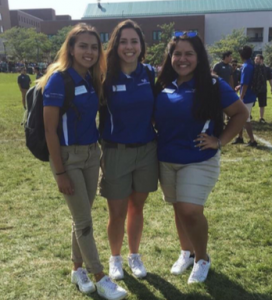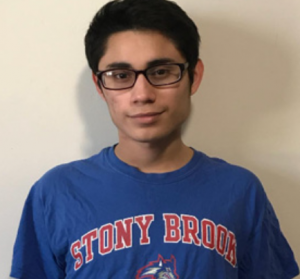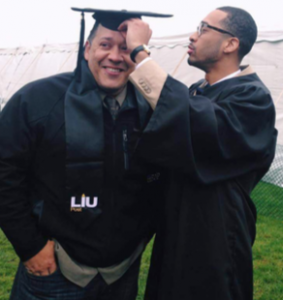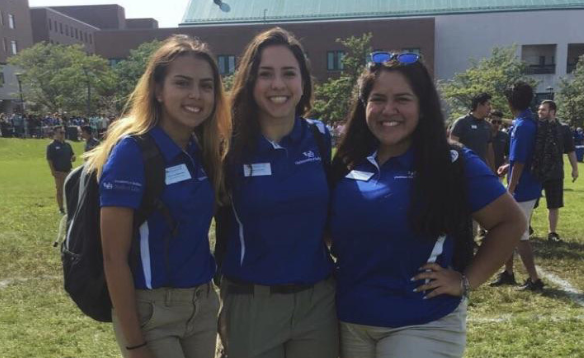By Jacqueline Escobar
Staff Writer
Students from multiple colleges across New York traveled to Albany on Feb. 13 to advocate on behalf of the Higher Education Opportunity Program (HEOP) and other financial aid programs. The students met with state legislators and shared the significant impacts of state funded programs such as Educational Opportunity Program (EOP) and HEOP in their educational and personal journeys. Students represent their colleges every year at HEOP Advocacy Day, with an estimated 700 students attending this year. Although LIU Post students did not attend this year, LIU Post has participated in the HEOP advocacy day in the past.

William Clyde, director of the LIU Post HEOP program, sent an email on Feb. 12 telling students that their voices “can still be heard to add to the reasons why programs like HEOP and TAP require continued legislative support” and urging students to use “the power of social media” to send messages to their legislators “on Facebook, Twitter or Instagram.”
EOP provides financial and academic support to those who show promise in excelling in academia but were not offered admission through regular standards for New York universities. HEOP is a support program for New York State residents who are not prepared academically and financially to attend college, but who have a passion and potential to succeed in academia in New York State private colleges and universities. The programs are administered by the New York State Education Department (NYSED), and are valuable for students from low socioeconomic communities. Although programs like these can potentially be removed when the state budget is made, students want to remind lawmakers how grateful they are for the programs.
Stephanie Guardado, a sophomore speech and hearing science major at the University of Buffalo, is an EOP student. Guardado, whose parents are from El Salvador, was born and raised in Hempstead.
Guardado appreciates her experience as an EOP student. “I’m really glad to be a member of the EOP family here at UB. Everyone is united within the organization,” she said. “Because of EOP, I was able to come to Buffalo. Being here a summer before my freshman year was a requirement for students in EOP and I am grateful to have had that experience, it prepared me for the years to come and I learned most of my study skills over the summer,” Guardado said.
Guardado supports those students who advocate for the programs.“It’s an important part of our education journey; many people I know wouldn’t be in college at all without EOP or HEOP,” Guardado said. “I would be really sad if they would to remove an amazing program like this; they would be taking chances for other students to have a chance in the academic journey away,” she said.
Guardado has a message for those in EOP and EOP programs. “Because of EOP and HEOP, we can prove them [the statistics] wrong and we’re lucky to be a part of this amazing program that gives me and many others like this to make our family, friends, and community proud of what we’re doing and who we’ll become in the future,” she said.
Edwin Uben Solis, a junior applied mathematics major at SUNY Stony Brook University, is half Salvadorian and half Guatemalan. Solis, who was also born and raised in Hempstead, graduated at the top of his class from Hempstead High School in 2015. Solis appreciates the support that was given to him as an EOP student.

At Stony Brook, students received a $450 stipend for books and iPads as entering freshmen, which assisted them with their academics. “EOP has helped me academically because of numerous tutors at my disposal. [The iPad] enabled me to do my work anytime and place, which is a blessing because some students are underprivileged enough that they don’t have the luxury to afford technology,” Solis said.
“I would be devastated if EOP were to be removed for others since I know a lot of people who aren’t able to attend college,” he said.
Adam Hornbuckle, a senior political science major at LIU Post, values the support HEOP has given him.
“I cannot say enough about the Higher Education Opportunity Program at LIU Post. HEOP has been my key to the door of opportunity and education. Since arriving at Post in the summer of 2014, much in my life has changed; but one of the few constants has been the support and guidance that the program gives and its director, William Clyde Jr.,” Hornbuckle said.
Clyde, has overseen the HEOP program at Post since 1981 and became director in 1986. He ensures that students are prepared for academic success during the four years of college and provides a strong foundation for many students. “No matter where you are, or where you come from – where you landed in school, if you are EOP or HEOP, you all represent what our program is about,” he said. “LIU made its commitment to the program to continue to advocate for its continuance and funding at current levels,” he said.
Hornbuckle stressed the importance of maintaining the program. “As per its longevity, what I can say is that the program cannot be measured in dollars and cents; rather only in success and accomplishment, in which it is bountiful. If LIU removed the program, it would be more than just a fiscal cut. It would be the revocation of the ever-important bridge between potential and attainment,” he said.
Hornbuckle said HEOP has given him lifelong friends and “unwavering confidence in myself and a hunger for knowledge.”
Jeremiah Aviles, a 2012 Post and HEOP graduate who works as an educator, attended the HEOP Lobby Day when he was a student at Post.
Aviles’s experience in Albany was memorable, seeing a variety of students from different universities coming together, walking into state government offices and advocating for the continuance of the programs.

Being a HEOP student was a blessing for Aviles, since he is the first male son, cousin, and nephew to graduate from college in his family.
“HEOP has opened many doors for me and I would hate to see the program removed from an institution that supposedly cares for our black and brown folks who are labeled as unsuccessful, jobless, poor and so on; it would be devastating, and I would be the first to tell William Clyde Jr. to allow me to be his advocator for such an amazing program,” he said.







Be First to Comment